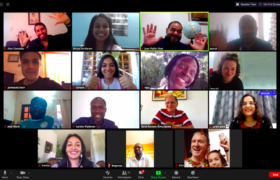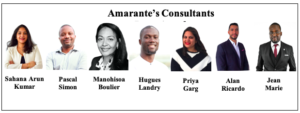
The coronavirus pandemic has become all too familiar in the last 5 to 6 months. This crisis started as a health one and is morphing into a recession affecting global economies. The high transmissibility of the virus has caused countries and cities to lock down. However, from an alternate perspective, this situation has presented many opportunities and transformed the way we function, as humans and societies. We are starting to realise the power of something magical in our reach: technology coupled with the internet.
Out of sheer necessity for business continuity, this pandemic has propelled companies head first into the unexplored waters of online working. Corporates, NGOs, social enterprises and governments are all experimenting with this new model of remote work. But this way of day-to-day remote working is not at all new to some. Amarante has been using the remote work model since its establishment in 2008. With consultants all over the globe, this model has enabled us to successfully work with a global client base and deliver our services based on local and cultural expertise. Though the COVID-19 situation brought the implementation of a few projects to a pause, we are able to continue to work with our clients and deliver thanks to our successful remote work model.
This model is one that more and more firms will adopt in the future, small companies and big alike. To better understand the nuances of remote work, seven of Amarante’s consultants share their personal and professional experiences with the model.
Amarante has three main offices worldwide – one based Dubai, one based Mexico City and one, via its Joint Venture “Avrio Impact”, based in France – but all consultants (located across continents) work adopting a distributed model, where access to their laptop and Amarante shared platforms, & tools and connectivity to the internet is of prime essence to be able to function and deliver on the job, on time.
A major part of Amarante’s work is on a project and client basis so consultants based in the region/country in question or with the relevant project related expertise usually are the ones to provide the required services to clients in the area. This work is supervised, on the job, by Amarante senior staff and management, ensuring cross pollination of best practices, guidance and quality control which is an essential part of the service offered. For operations to function in a streamlined manner, Amarante’s team utilises digital tools and platforms such as Google Drive, Skype, Zoom, Whatsapp, Email and Dropbox to coordinate, collaborate and communicate with each other, making the virtual world their office space. Of course, when interacting with clients and their markets, on-site field work and in-person meetings and work sessions proceed. Consultants work in partnership with market research firms, or other in-country actors (technology companies, UX designers,…) when required. These partnerships are playing an increasing role during COVID-19 as consultants lead projects from afar and rely on local in-country colleagues and partners to deliver work on the ground. As a company promoting digital transformation and the digital future, remote work gives a chance to explore digital tools and understand the benefits and challenges they bring which in turn can prove useful when working for their clients.
Many clients/ customers are moving online and prefer to use digital tools for communication, discussions and even workshops.
“It gives the message that you need skills to make sure you can take on the present ‘new normal’ and be ready for the future”.
– Alan Ricardo Gonzalez
This has been difficult in areas of low digital literacy, but provides an opportunity to accelerate adoption. Many are beginning to understand the nuanced conventions of using different digital tools. Even before Covid, the remote work model allowed our consultants to constantly deliver, using this hybrid, distributed mix of local and international expertise, working together seamlessly across boundaries, thanks to how technology can connect and enable us all in today’s world. As a result, Amarante’s modus operandi and business is not as seriously impacted by the crisis, thus far.
So what advantages does Amarante’s experience in sustaining an online office model provide? Firstly, it allows for a light structure as there is limited need for investment in office space and other capital heavy assets. But more importantly, it allows flexibility and mobility.
“COVID-19 has created problems but we can go forward despite this”
– Hugues Landry N’gbesso
Despite travel bans, there are constantly consultants on the ground, in our clients’ priority markets and where the action is happening. For Amarante colleagues and staff, working from home saves time on transport and traffic, especially for those living in large metropolitan cities. Working from home also provides more flexibility, autonomy, productivity and concentration.
However the online work model, like any method of work, has its share of disadvantages. Consultants recount that there is a learning curve and, at first, working from a distance is a challenge as it requires more discipline and organization; establishing a routine and getting used to it is key. The other challenge with a business model built around remote work is one that is becoming all too familiar especially during the crisis: The lack of human touch and interaction. There is often a gap in HR and team building activities. In an office setting, becoming familiar with your colleagues happens organically.
“Companies would be able to manage but how employees take it, that matters more”
– Priya Garg
Virtually, someone has to take an initiative. With deadlines and intense workload, taking virtual team breaks for coffee or a corridor chat need to be planned and organised. This is all the more needed with a growing team and especially when new colleagues join the company. For consultants working in distant locations, they sometimes miss having a colleague or a team to work with. Tasks as simple as clarifying questions could see one waiting a while for an answer… and time zone differences do not help! Furthermore, with an office on your device, sometimes it is difficult to stick to a typical 9-5 schedule or complete a set of 8-10 working hours.
“With the remote model, work space and home space could be in the same general area, and this can become a challenge to manage”
– Sahana Arun Kumar
After years of practice, Amarante is working towards overcoming these challenges by building team ethos and creating a DNA across regions. For example, a few weeks ago the team held an informal zoom call for all employees to interact and engage in virtual “off site, team building activities” and getting to know each other in a more informal setting, interacting with family members as well, and consequently bringing in this vital angle of a human interaction outside of the work space. This was all the more essential and productive given COVID-19 stress and the need to come together and have a lighter moment without deadlines, deliverables and project troubleshooting. Amarante plans to continue these types of virtual “coffee breaks” and team building initiatives in the future.
Another useful tool when working with distributed teams, is Clockify. Amarante Consultants are experimenting with this platform which allows them to track their working hours and activities grouped by teams and by projects. The platform allows teams to collaborate and build on each other’s progress across continents and time zones. The Amarante team in Latin America (LATAM) is experimenting with a hybrid work model. They have an office in Mexico city to which consultants will commute to 3-4 times a week (this has been halted till end of the year due to lockdown in Mexico).
“We must continue to use these tools to make sure the work we deliver is still of high quality within timeframes committed to our clients”
– Pascal Simon
Through this physical office, the LATAM team has an easier onboarding process and the team of four consultants have developed personal relationships more organically. This allows consultants to interact, collaborate face to face when needed and still have some flexibility with working remotely all the while staying connected to their colleagues around the world. As mentioned, due to the COVID-19 pandemic, the LATAM team is not continuing in the home office till January 2021. They went through this transition process which many companies around the world have gone through, physical to completely digital. As we know, digital platforms require adapting to a different skill set and reworking logistics. Projects across South America are now co-ordinated through on ground associate consultants and remotely handled from Mexico base.
“Though it may not be compatible with professional challenges and hectic days, it is important to bring more personal or human consideration into a remote working model”
– Manohisoa Boulier
The shared advice of our consultants is for companies to focus on employee wellbeing when choosing to switch to remote working. It requires a lot of autonomy from employees to be able to manage and complete their work as per time schedule and quality expectations. The top management must trust employees enough to allow them this flexibility and provide them with a guide on how to navigate the company’s online ecosystem and familiarize themself with the company ethos and do’s/ don’ts in a tele-working realm. Each member of the team must be comfortable in reaching out to their colleagues and manager as regularly and as much as needed Indeed, the “open door” policy should exist in the virtual world as well. The whole company DNA, employee-employer dynamic, working process and communications ethos must be carefully outlined and steadily implemented.
Of course with the COVID-19 situation, most firms are rushed into this process. However, from the word of veterans in the online work model, companies and employees have to navigate a newly evolved relationship. Companies must present set guidelines and expectations to all employees. They must restructure to be equipped to manage teams remotely. This training should enable employers and employees alike, to gain a digital work ethic and skill-set and effectively use a healthy mix of online platforms efficiently.
“The COVID situation really shows that working online is an option”
– Jean Marie Leosgho
Similarly, employees need to have an aptitude to work autonomously and work by the company’s expectations with regards to new norms for tele-working. They need to have a willingness to learn and use digital tools both ethically and effectively. With the correct guidance and working ethos including clear remote-working agreements and checks and balances, the digital distributed work model can prove to be a valuable asset for companies both during and post the Covid-19 crisis.
